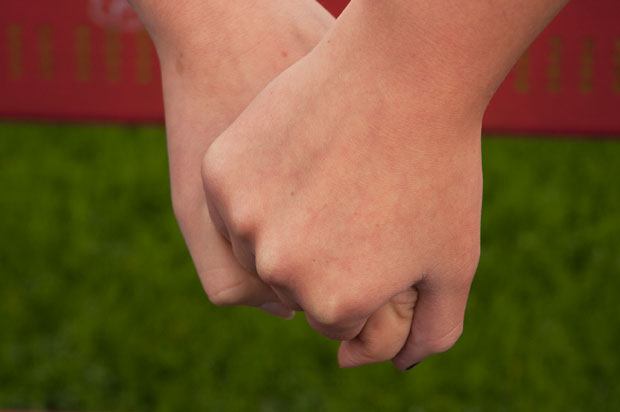When your boyfriend/girlfriend self-harms
If the person you’re in a relationship with tells you that they’ve been self-harming, this can be incredibly tough - it’s important to stay calm, and not blame yourself so that you’re able to help them in the best way possible. The Mix looks at what steps to take when your boyfriend or girlfriend self-harms.

How will I know if my boyfriend or girlfriend self-harms?
If something about your partner’s behaviour feels off and you suspect that they might be self-harming, then don’t be afraid to bring it up and ask them. Gently ask them how they are feeling about life and themselves, and bring up what you’ve noticed, sensitively. Self-harm is a very private issue, so talk to them first about it before telling anyone else.
It’s important that you listen to what they say without judgement, and that you don’t try to push them to talk to you about it if they really don’t want to. They’ll open up in their own time, and just knowing that you’re willing to talk to them about it might help them take the first step.
Talking to a partner about their self-harm
You may feel angry, upset and confused, but remember that your partner is in a difficult situation too. It may be the first time they’ve been asked about it so take a breath, step back emotionally, talk to them gently, and be as objective and non-judgemental as you can.
“Sometimes gentle questioning can be appropriate, but bear in mind that self-harm may be a way of managing intense pain,” says Psychiatrist Louise Theodosiou. “A partner would need to make sure that the questions were asked somewhere private and that they had time to support their partner with any answers they may provide.”
It’s important that you listen to what they say without being combative, and that you don’t try to push them to talk to you about it if they really don’t want to. They’ll open up in their own time, and just knowing that you’re willing to talk to them about it might help them take the first step.
Understanding why a partner self-harms
“It’s important to remember that people self-harm for different reasons. It could be a long-term coping strategy, or an intense reaction to distress or depression,” says Louise.
If your partner tells you that they’re self-harming, it’s best not to push them for details that they might not be comfortable sharing – they might not even fully understand why they do it or how serious it is if you’re the first person they’ve spoken to about it. If you can, try to:
- Find out what makes them want to hurt themselves
- Help them work out what they could do instead as a distraction or an alternative
“My girlfriend knows I self-harmed, but we don’t talk about it – she has a more serious history of it than I do,” says Leanne, 19. “I don’t feel we share a romanticised bond of two tortured souls against the world. As she reminds me, I will never know where she’s coming from because I don’t have a guidebook on human emotion. I feel close to her because I love her. And that has nothing to do with the scars on her body.”
Does it mean my partner is depressed if they self-harm?
Just because a person self-harms, it doesn’t always mean that they’re depressed – although they could be. Self-harm is more likely to be a way of managing painful feelings and is not necessarily a sign of severe depression, threat of suicide or mental illness. It can even be a way to physically release inner tension. However, sometimes it can mean more.
“Many people use self-harming as a coping mechanism, which actually serves the purpose of keeping themselves safe,” says psychiatric social worker Karen Wright.
If you’re worried your boyfriend or girlfriend self-harms and seems very depressed, then you can speak to your doctor or ring a helpline for advice.
How can I help someone who self-harms?
It’s natural that if someone you care about tells you that they self-harm, then you’ll want to do everything you can to help them stop. The most important thing to remember is that you can’t make them stop if they’re not ready. But there are some things you can do to help them get help.
Don’t make them promise not to do it again
You might be tempted to ask them not to do it again – most of the time, this won’t work, as self-harm is a habit. Placing emotional demands on them like this can make them feel worse, as they might feel that they’re letting you down if they do do it again. Try to remember that this is about them, not you and your relationship.
If your boyfriend/girlfriend self-harms, they need to understand why they are doing it and find their own ways of replacing self-harm. Try not to focus on the self-harm but about what’s going on behind it instead. If you get them to make a promise they can’t keep it may end up causing feelings of shame and, as a result, more secrets.
Encouraging someone who self-harms to get help
It’s a positive step if they’ve managed to open up to you, but talking to a trained counsellor or health professional would be even better. You should:
- Encourage them to seek specialist help and offer to go with them if they’re worried about doing it alone.
- Don’t push or threaten your partner with ending the relationship if they say no to further help – try and go at their pace.
- Offer to tell someone for them or to find out more information – the only real way to recovery is for them to recognise there are other ways to deal with how they feel inside.
- Don’t ignore what they’ve told you. It might be uncomfortable for you to deal with, but it’s a guarantee that it’s even harder for them. You have to acknowledge the conversation rather than pretend it never happened.
- Be there emotionally for them as much as you can, but remember you have to be there for yourself too. It’s okay to need time to get your head around it.
Next Steps
- RecoverYourLife.com is an online community where you can get peer support for self-harm and other mental health problems.
- Anyone can contact the Samaritans on their 24-hour helpline to talk things through. 116 123
- Chat about this subject on our Discussion Boards.
By Holly Turner
Updated on 27-Mar-2021
Sorry, comments closed
No featured article







